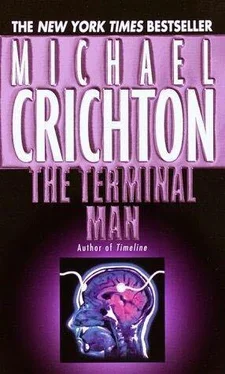Michael Crichton - The Terminal Man
Здесь есть возможность читать онлайн «Michael Crichton - The Terminal Man» весь текст электронной книги совершенно бесплатно (целиком полную версию без сокращений). В некоторых случаях можно слушать аудио, скачать через торрент в формате fb2 и присутствует краткое содержание. Жанр: Фантастика и фэнтези, на английском языке. Описание произведения, (предисловие) а так же отзывы посетителей доступны на портале библиотеки ЛибКат.
- Название:The Terminal Man
- Автор:
- Жанр:
- Год:неизвестен
- ISBN:нет данных
- Рейтинг книги:3 / 5. Голосов: 1
-
Избранное:Добавить в избранное
- Отзывы:
-
Ваша оценка:
- 60
- 1
- 2
- 3
- 4
- 5
The Terminal Man: краткое содержание, описание и аннотация
Предлагаем к чтению аннотацию, описание, краткое содержание или предисловие (зависит от того, что написал сам автор книги «The Terminal Man»). Если вы не нашли необходимую информацию о книге — напишите в комментариях, мы постараемся отыскать её.
The Terminal Man — читать онлайн бесплатно полную книгу (весь текст) целиком
Ниже представлен текст книги, разбитый по страницам. Система сохранения места последней прочитанной страницы, позволяет с удобством читать онлайн бесплатно книгу «The Terminal Man», без необходимости каждый раз заново искать на чём Вы остановились. Поставьте закладку, и сможете в любой момент перейти на страницу, на которой закончили чтение.
Интервал:
Закладка:
"Clever," the cop said. He pointed to the closet. "But he can't get far. He left his clothes."
"Took his shoes."
"A man with bandages and a bathrobe can't get far, even if he has shoes." He shook his head. "I better call this in."
"Did Benson make any calls?"
"Tonight?"
"No, last month."
"Look, lady, I don't need any of your lip right now."
She saw then that he was really quite young, in his early twenties, and she saw that he was afraid. He had screwed up, and he didn't know what would happen. "I'm sorry," she said.
"Yes, tonight."
"He made one call," the cop said. "About eleven."
"Did you listen to it?"
"No." He shrugged. "I never thought…" His voice trailed off. "You know."
"So he made one call at eleven, and left at eleven-thirty." She walked outside to the hallway and looked down the corridor to the nurses' station. There was always somebody on duty there, and he would have to pass the nurses' station to reach the elevator. He'd never make it.
What else could he have done? She looked toward the other end of the hall. There was a stairway at the far end. He could walk down. But seven flights of stairs? Benson was too weak for that. And when he got to the ground-floor lobby, there he'd be, in his bathrobe with his head bandaged. The reception desk would stop him.
"I don't get it," the cop said, coming out into the hallway. "Where could he go?"
"He's a very bright man," Ross said. It was a fact that they all tended to forget. To the cops, Benson was a criminal charged with assault, one of the hundreds of querulous types they saw each day. To the hospital staff, he was a diseased man, unhappy, dangerous, borderline psychotic. Everyone tended to forget that Benson was also brilliant. His computer work was outstanding in a field where many intelligent men worked. On the initial psychological testing at the NPS, his abbreviated WAIS I.Q. test had scored 144. He was fully capable of planning to leave, then listening at the door, hearing the cop and the nurse discuss going for cigarettes - and then making his escape in a matter of minutes. But how?
Benson must have known that he could never get out of the hospital in his bathrobe. He had left his street clothes in his room - he probably couldn't get out wearing those, either. Not at midnight. The lobby desk would have stopped him. Visiting hours had ended three hours before.
What the hell would he do?
The cop went up to the nurses' station to phone in a report. Ross followed along behind him, looking at the doors. Room 709 was a burns patient; she opened the door and looked inside, making sure only the patient was there. Room 708 was empty; a kidney-transplant patient had been discharged that afternoon. She checked that room, too.
The next door was marked SUPPLIES. It was a standard room on surgical floors. Bandages, suture kits, and linen supplies were stored there. She opened the door and went inside. She passed row after row of bottled intravenous solutions; then trays of different kits. Then sterile masks, smocks, spare uniforms for nurses and orderlies-
She stopped. She was staring at a blue bathrobe, hastily wadded into a corner on a shelf. The rest of the shelf contained neatly folded piles of white trousers, shirts, and jackets worn by hospital orderlies.
She called for the nurse.
"It's impossible," Ellis said, pacing up and down in the nurses' station. "Absolutely impossible. He's two days - a day and a half - post-op. He couldn't possibly leave."
"He did," Janet Ross said. "And he did it the only way he could, by changing into an orderly's uniform. Then he probably walked downstairs to the sixth floor and took an elevator to the lobby. Nobody would have noticed him; orderlies come and go at all hours."
Ellis wore a dinner jacket and a white frilly shirt; his bow tie was loosened and he was smoking a cigarette. She had never seen him smoke before. "I still don't buy it," he said.
"He was tranked out of his skull with thorazine, and- "
"Never got it," Ross said.
"Never got it?"
"What's thorazine?" the cop said, taking notes.
"The nurses had a question on the order and didn't administer it. He had no sedatives and no tranquilizers since midnight last night."
"Christ," Ellis said. He looked at the nurses as if he could kill them. Then he paused. "But what about his head? It was covered with bandages. Someone would notice that."
Morris, who had been sitting silently in a corner, said,
"He had a wig."
"You're kidding."
"I saw it," Morris said.
"What was the color of the wig in question?" the cop said.
"Black," Morris said.
"Oh Christ," Ellis said.
Ross said, "How did he get this wig?"
"A friend brought it to him. The day of admission."
"Listen," Ellis said, "even with a wig, he can't have gotten anywhere. He left his wallet and his money. There are no taxis at this hour."
She looked at Ellis, marveling at his ability to deny reality. He just didn't want to believe that Benson had left; he was fighting the evidence, fighting hard.
"He called a friend," Ross said, "about eleven." She looked at Morris. "You remember who brought the wig?"
"A pretty girl," Morris said.
"Do you remember her name?" Ross said, with a sarcastic edge.
"Angela Black," Morris said promptly.
"See if you can find her in the phone book," Ross said.
Morris began to check; the phone rang, and Ellis answered it. He listened, then without comment handed the phone to Ross.
"Yes," Ross said.
"I've done the computer projection," Gerhard said. "It just came through. You were right. Benson is on a learning cycle with his implanted computer. His stimulation points conform to the projected curve exactly."
"That's wonderful," Ross said. As she listened, she glanced at Ellis, Morris, and the cop. They watched her expectantly.
"It's exactly what you said," Gerhard said. "Benson apparently likes the shocks. He's starting seizures more and more often. The curve is going up sharply."
"When will he tip over?"
"Not long," Gerhard said. "Assuming that he doesn't break the cycle - and I doubt that he will - then he'll be getting almost continuous stimulations at six-four a.m."
"You have a confirmed projection on that?" she asked, frowning. She glanced at her watch. It was already 12:30.
"That's right," Gerhard said. "Continuous stimulations starting at six-four this morning."
"Okay," Ross said, and hung up. She looked at the others.
"Benson has gone into a learning progression with his computer. He's projected for tipover at six a.m. today."
"Christ," Ellis said, looking at the wall clock. "Less than six hours from now."
Across the room, Morris had put aside the phone books and was talking to Information. "Then try West Los Angeles," he said, and after a pause, "What about new listings?"
The cop stopped taking notes, and looked confused. "Is something going to happen at six o'clock?"
"We think so," Ross said.
Ellis puffed on his cigarette. "Two years," he said, "and I'm back on them." He stubbed it out carefully. "Has McPherson been notified?"
"He's been called."
"Check unlisted numbers," Morris said. He listened for a moment. "This is Dr. Morris at University Hospital," he said,
"and it's an emergency. We have to locate Angela Black. Now, if- " Angrily, he slammed down the phone. "Bitch," he said.
"Any luck?"
He shook his head.
"We don't even know if Benson called this girl," Ellis said. "He could have called someone else."
"Whoever he called may be in a lot of trouble in a few hours," Ross said. She flipped open Benson's chart. "It looks like a long night. We'd better get busy."
The freeway was crowded. The freeway was always crowded, even at 1 a.m. on a Friday morning. She stared ahead at the pattern of red tail-lights, stretching ahead like an angry snake for miles. So many people. Where were they going at this hour?
Читать дальшеИнтервал:
Закладка:
Похожие книги на «The Terminal Man»
Представляем Вашему вниманию похожие книги на «The Terminal Man» списком для выбора. Мы отобрали схожую по названию и смыслу литературу в надежде предоставить читателям больше вариантов отыскать новые, интересные, ещё непрочитанные произведения.
Обсуждение, отзывы о книге «The Terminal Man» и просто собственные мнения читателей. Оставьте ваши комментарии, напишите, что Вы думаете о произведении, его смысле или главных героях. Укажите что конкретно понравилось, а что нет, и почему Вы так считаете.









